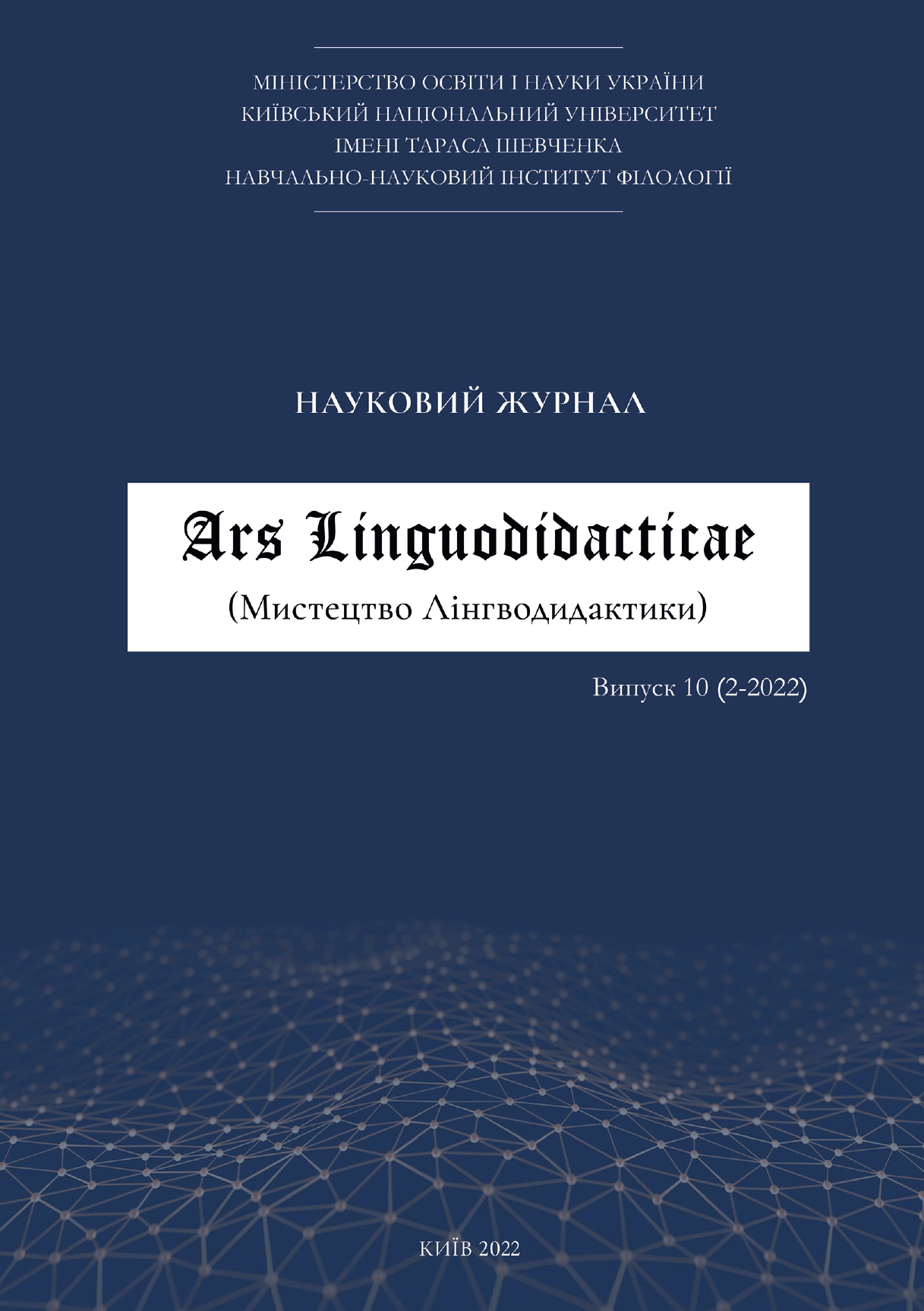МОТИВАЦІЙНІ ЧИННИКИ НАВЧАННЯ СТАРШОКЛАСНИКІВ РЕДАГУВАННЯ УКРАЇНСЬКОГО ТЕКСТУ
DOI:
https://doi.org/10.17721/2663-0303.2022.2.01Ключові слова:
мотиваційні чинники, текстоцентричний підхід, компетентність у галузі редагування, мовна норма, опитувальникАнотація
Стаття репрезентує результати дослідження мотиваційних чинників розвитку компетентності редагування українських висловлювань і текстів у процесі вивчення української мови в старшій школі. В основу дослідження покладено метод опитування та текстоцентричний підхід у навчанні української мови в старшій школі. У фокусі уваги авторів постали: знання й уміння редагувати висловлювання, що викликають труднощі в писемному мовленні; рівень задоволення учнів власною компетентністю редагування; мотиваційні потреби учнів здійснювати діяльність редагування задля успішності в житті і професії, самостійно впливати на сценарій опанування шкільної програми. Автори пропонують враховувати думку старшокласників для корекції типових програм з української мови в 10-11-му класах, зокрема застосувати блоковий принцип для формування редакторських умінь та засвоювати мовні норми безпосередньо під час роботи з текстом. Встановлено, що старшокласники прагнуть автономії в організації навчання редагуванню в школі, керуються зовнішніми й внутрішніми мотиваційними чинниками, які відповідають кільком пунктам шкали AMS-28 (Vallerand, Blais, 1992).
Посилання
Bandura, A., & Locke, E. (2003). Negative self-efficacy and goal effects revisited. Journal of Applied Psychology, 88(1), 87-99. https://doi.org/10.1037/0021-9010.88.1.87
Byrd, D.(2003). Practical tips for implementing peer editing tasks in the foreign language classroom. Foreign Language Annals, 36(3), 434-441. https://doi.org/10.1111/j.1944-9720.2003.tb02125.x
Diab, N. (2010). Effects of peer-versus selfediting on students’ revision of language errors in revised drafts. System, 38, 85-95. https://doi.org/10.1016/j.system.2009.12.008
Dörnyei,Z.(2020). Іnnovations and сhallenges in language learning motivation. Routledge. https://doi.org/10.4324/9780429485893
Dörnyei, Z., & Taguchi, T. (2010). Questionnaires in second language research: Construction, administration, and processing (2nd ed.). Routledge. https://doi.org/10.4324/9780203864739
Fırat, E., & Laramee, R. (2018). Towards a survey of interactive visualization for education. In Tam, G. and Vidal, F. (Eds.) Computer Graphics and Visual Computing: The Eurographics Association, 91-101.
Gonzales, R., & Lopez, M. (2015). Foreign language learning motivation questionnaire: Further examination of a six-factor model. Development Strategists International Consulting, 1-24. Inc. & University of Santo Tomas Graduate School, Manila.
Holub, N. (2015). Kontseptualni zasady suchasnoi metodyky navchannia ukrainskoi movy v zahalnoosvitnii shkoli [Conceptual grounds of modern methods of teaching the Ukrainian language in a secondary school]. Ukrainskyi pedahohichnyi zhurnal, 1, 107-118. In Ukr.
Holub, N., Horoshkina O. (2019). Kontseptsiia navchannia ukrainskoi movy uchniv starshoi shkoly [The concept of teaching the Ukrainian language to high school students]. Pedahohichna dumka. In Ukr.
ISCED.(2011). Operational manual: Guidelines for classifying national education programmes and related qualifications. OECD Publishing. https://doi.org/10.1787/9789264228368-en.
Jesnek, L. (2011). Peer editing in the 21st century college classroom: Do beginning composition students truely reap the benefits? Journal of College Teaching & Learning, 8(5), 17-24. https://doi.org/10.19030/tlc.v8i5.4257
King, R., Datu, J (2018). Grateful students are motivated, engaged, and successful in school: Cross-sectional, longitudinal, and experimental evidence. Journal of School Psychology, 70, 105–122. https://doi.org/10.1016/j.jsp.2018.08.001
Leshchenko, H. (2016). Osoblyvosti roboty z tekstom na urokakh ukrainskoi movy za kompetentnisnym pidkhodom [Specifics of working with the text in Ukrainian language lessons according to the competence approach]. Naukovyi Visnyk Skhidnoievropeiskoho Natsionalnoho Universytetu imeni Lesi Ukrainky. Pedahohichni nauky, 1, 79-85. In Ukr.
Little, D. (2006). Learner autonomy: Drawing together the threads of self-assessment, goalsetting and reflection. Training teachers to use the European Language Portfolio. European Centre for Modern Languages.
Liubashenko, O. (2013). Tekstotsentrychnyi pidkhid u pobudovi linhvodydaktychnykh stratehii navchannia u vyshchii shkoli [A text-based approach in the construction of teaching and learning strategies in higher education]. Naukovi Zapysky: Zbirnyk Statei, 112, 107-113. In Ukr.
Machtakova, O. (2013). Motyvatsiia: vid antychnosti do postmodernu: Monohrafiia. [Motivation: from antiquity to postmodernity]. Atlant. In Ukr.
Patten, M. (2016). Questionnaire research: A practical guide. Routledge. https://doi.org/10.4324/9781315265858
Shapoval, T. (2005). Rozvytok indyvidualnosti y motyvy uchinnia v starshomu shkilnomu vitsi [Development of individuality and learning motives in high school age]. Psykholoh, 1, 3-7. In Ukr.
Shelekhova, H. (2012). Formuvannia motyvatsii na urokakh ukrainskoi movy v uchniv osnovnoi shkoly [Modeling of motivation in Ukrainian language lessons among primary school students]. Teoretychna i Dydaktychna Filolohiia: Zbirnyk Naukovykh Prats, 12, 29 – 34. In Ukr.
Vallerand, R., Pelletier, P.J., Blais, L. G., Briere, N. M., Senécal, C., & Vallieres, E. (1992). The academic motivation scale: a measure of intrinsic, extrinsic, and amotivation in education. Educational and Psychological Measurement, 52(4), 1003–1017. https://doi.org/10.1177/0013164492052004025.
##submission.downloads##
Опубліковано
Як цитувати
Номер
Розділ
Ліцензія
Авторське право (c) 2022 Олеся Любашенко, Олександра Зайцева

Ця робота ліцензується відповідно до Creative Commons Attribution-NonCommercial 4.0 International License.
Ця робота ліцензується відповідно до Creative Commons Attribution-NonCommercial 4.0 International License.
Політика охорони авторських прав відповідно до умов ліцензії: Creative Commons Attribution-NonCommercial (Атрибуція-Некомерційне використання) 4.0 Міжнародна (CC BY-NC 4.0).
Автори, що публікують свої статті в журналі "Ars Linguodidacticae" (журналі відкритого доступу) зберігають за собою такі права:
- Автори зберігають за собою права на авторство своєї статті та надають журналу "Ars Linguodidacticae" право першої публікації рукопису своєї статті на умовах ліцензії Creative Commons (CC BY-NC 4.0) Attribution License, яка дозволяє іншим особам вільно розповсюджувати опубліковану роботу з обов'язковим посиланням на автора оригінальної роботи та першу оригінальну публікацію в журналі "Ars Linguodidacticae". Інформація про збереження права на авторство надається на титульній сторінці статті.
- Автори зберігають за собою право укладати окремі угоди на неексклюзивне розповсюдження своєї статті у тому вигляді, в якому вона була опублікована в журналі "Ars Linguodidacticae" (наприклад, розміщувати статтю в електронних бібліотеках, архівах та каталогах або публікувати у складі інститутських збірників та монографій), за умови обов'язкового повного посилання на першу оригінальну публікацію в журналі "Ars Linguodidacticae".
- Політика журналу "Ars Linguodidacticae" дає змогу та заохочує розміщення авторами в мережі Інтернет (наприклад в інститутському репозитарії або на персональному сайті) рукопису роботи як до її подання до редакції, так і під час її редакційного опрацювання, оскільки це сприяє продуктивній науковій дискусії та позитивно позначається на оперативності й динаміці цитування статті.
Редакція журналу зберігає за собою видавничі права на:
- зверстані оригінали статей та весь номер журналу;
- оформлення журналу, а також оригінальні ілюстративні та додаткові матеріали;
- репринтні перевидання журналу в друкованому та електронному вигляді.
Політика охорони авторських прав провадиться відповідно до умов ліцензії: Creative Commons Attribution-NonCommercial (Атрибуція-Некомерційне використання) 4.0 Міжнародна (CC BY-NC 4.0).
Для отримання додаткової інформації, будь ласка, прочитайте повний текст Публічної ліцензії CC BY-NC 4.0
Creative Commons Attribution-NonCommercial 4.0 International License.

